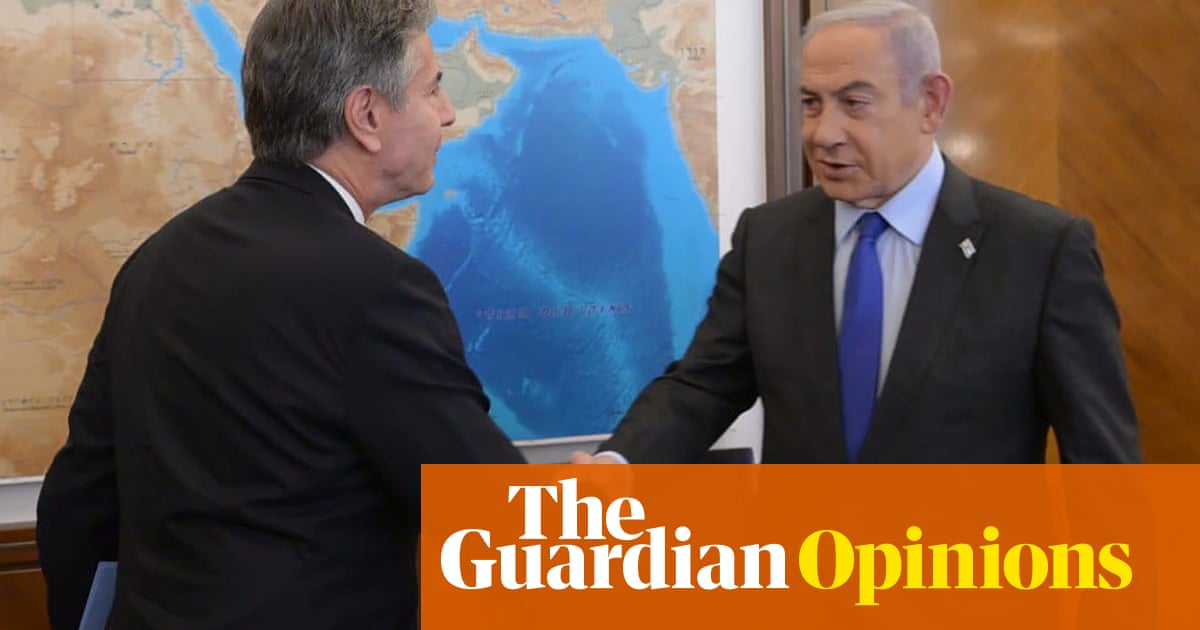
Benjamin Netanyahu should have resigned after an hour, then a day, then a week and a month after the 7 October debacle, the most horrific day in Israel’s history. He did not, because he isn’t wired that way. Accountability and integrity are alien concepts reserved for the weak and feeble – not for him. He sees himself as a historic figure, responsibility as beneath him. He is not merely defiant, but terrified that his trial for corruption and bribery would proceed if he was to resign, and paralysed by the thought that he and the state will no longer be one.
Ever since 6:29am on 7 October, he has been on the defensive; trying to salvage himself by deflecting responsibility on to the military and the Shabak (Israel’s internal security service), blaming faulty intelligence and devising a parallel narrative in which he is now leading Israel in a second formative war of independence to try to save western civilisation from Islamo-fascism. A man who likens himself to Winston Churchill has fallen short of the example set by Neville Chamberlain, who resigned in 1940 after the German conquest of Norway.
The trajectory of the war puts two sets of pressures on Netanyahu: one is domestic and the other is American. Netanyahu has a major credibility deficit in the US. This goes back many years and spans several presidents, but with Joe Biden it was compounded during the first nine months of 2023, when the Israeli prime minister launched a constitutional coup disguised thinly as “judicial reform”. Biden publicly disapproved of Netanyahu’s authoritarian turn and noticeably refrained from inviting him to Washington during that period.
On the eve of 7 October, the US was on a clear course to disengage from the Middle East. The reasons were many: its attainment of energy independence, fatigue and disillusionment with costly wars in Afghanistan and Iraq, as well a strategic shift to the Indo-Pacific region and a recognition that the main challenge is now posed by China. But this strategy was shattered by 7 October, as the likelihood of“horizontal escalation” increased: the possibility that the war could lead to conflict between Israel and Hezbollah. Washington was concerned this could conceivably drag the US into active military involvement against Iran. This is why the US has put pressure on Israel to scale down military operations in Gaza and continue the series of truces.
At the same time, although a full year away from the US presidential election in November 2024, President Biden is beginning to pay a domestic political price for his unwavering support of Israel. His backing during the Gaza bombardment is viewed by many in the US as unbalanced. That impression is incorrect – his support has been conditional on Israel avoiding escalation with Hezbollah, limiting the ground operation and allowing for pauses to release hostages – but the images of the devastation in Gaza have provoked sympathy for the plight of the Palestinians from much of the US public.
Then comes the issue of “the day after”. The US has asked, and keeps asking, Israel about its vision of postwar Gaza and the political vacuum that will be left if Hamas is eliminated. Who will govern? Does Israel intend to stay? For how long? Will it assume governance responsibilities? Netanyahu has so far evaded the issue, with hollow one-liners such as: “There will be no Hamas.”’ As far as the Americans are concerned, Netanyahu’s reluctance to address the issue increases the likelihood of eventual escalation and reflects his cluelessness and indifference. It was Netanyahu, after all, who actively strengthened Hamas to weaken the Palestinian Authority.
Netanyahu’s credibility is also at a low within Israel. The hundreds of thousands who demonstrated against his constitutional coup throughout 2023 will morph into a mass movement calling for his resignation or an immediate election. He will probably develop a narrative in which he is shorn of responsibility for the attack due to a lack of warning – but that may not be enough to stem the tide.
Netanyahu’s shortcomings notwithstanding, much of the twin pressures he is under come from a fundamental gap in how Israel and Hamas define a “win”. The asymmetrical power relations between Israel, a formidable military power, and Hamas, a non-state terror organisation, are evident. For Hamas, a win can be declared if they stand on their feet and wave a single flag. For Israel, only a decisive military triumph that degrades Hamas militarily and renders it politically incapacitated will be enough. Netanyahu is well aware of that, which makes balancing the pressure from home and from the US an intractable task.
Alon Pinkas served as Israel’s consul general in New York from 2000 to 2004. He is now a columnist for Haaretz












